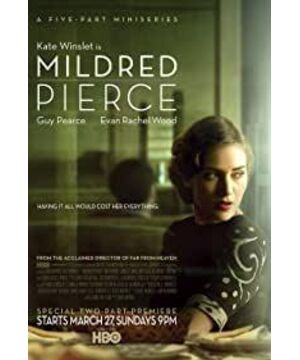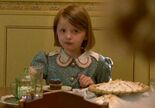This HBO's latest five-episode miniseries has been hailed as the "big winner of next year's Emmy Awards" before it even started airing. It’s not that there is any inside story, but it’s just that a few tantalizing features make people unable to help but think about the show: two people who are almost insulated from the TV show, the first collaboration between Kate Winslet and Todd Hines TV series, the story is adapted from the 1945 movie of the same name starring Joan Crawford and winning an Oscar. Todd Hines established his position as a celebrity director almost exclusively with three movies "Velvet Gold Mine", "Far from Heaven" and "I'm Not There". His unique social perspectives, bold scales and homosexuality in his works And feminist tendencies are fully spread out in this play, and it can basically be called a "face to face of Todd Hines". Kate Winslet, who won an Oscar two years ago, undoubtedly made an excellent choice. If she continues to make frequent films, she may be in danger of going downhill. She reinvests in the arms of the great director with this miniseries. This time More comfortable than before. The original work of the story is very well-known in American society. It has even become a social topic. The rock band "Sonic Youth" once used "Mildred work. She also used the same tactics, and in order to open a shop, she used three men one after another. These behaviors of her also affect her daughter invisibly, but her daughter is more decisive and animalistic than her. Therefore, in the adaptation of the original film, Todd Hines realized that instead of filming the mother's struggle, it was better to write the daughter's insidiousness. In the new drama, he deletes the plot of his daughter and finally kills the lover in order to leave more room for this insidiousness. Her selfishness, greed, insidiousness, and reversal of right and wrong have been infinitely magnified and become unlimited. The pretentious look when talking about classical music, the admiration of the nobility, and her vicious curses are not in the 1945 movie, or have been downplayed. In the new play, there is a transitional rendering of Vida’s bitch. It is not difficult to see that the performances of Morgan Turner and Evan Rachel Wood, both of the two actors who played Vida when he was a child and when he grew up. Other actors are different. They are more dramatic, not even like a real human being. But the more harsh the character is, the clearer the surrounding truth will be magnified. The formation of the child’s character is all affected by the surrounding environment: she has scheming, only because the people around her have too many scheming; she is artificial, only because the people around her blindly worship luxury life and aristocratic culture; she is selfish because No one in the world she lives in is unselfish; she can't tell right from wrong because no one teaches her how to distinguish right from wrong. There are three men in the weakened male drama, the heroine's ex-husband, her mistress Monty, and the man Valli who had a "living night" with her. Mildred used them all to achieve his career. At this point, the original movie is not as obvious as the new one. The heroine played by Joan Crawford is always a person controlled by men. When her husband filed for divorce, she was a victim. Even when she started to use her husband’s friend Vali, she felt it all the time. The opponent's strength. She was threatened and endured the aggressive words of men. She was using men, but she was actually being used by men. She finally chose to commit the crime, which was a demonstration of her incompetence. Even her snakelike daughter, because of a man's refusal, became a victim without the ability to resist. In the new play, this meaning is eliminated completely. The man has always acted as a doll. The strong tone in the movie has all been weakened. Even at the beginning of the first episode, the man who was supposed to "throw his wife ion" has the upper hand, but after two sentences, the husband has become Regardless, after the quarrel, he looked like a poor man who was kicked out of the house. Next, in all the negotiations with Mildred, the ex-husband said "Yes." Husband’s friend Valli still made some intimidating words in the original movie, but when he got here, he became a stupid man who was willing to invest in a big business after he tasted a little bit of fishy. As for the mistress, Monty, is a slut who is kept by a woman. She was used by Mildred and then by Mildred's daughter, Vida. In the end, the scene of her betraying Mildred even seemed a bit funny. All the refutations were taught by Wei Da, and it can be seen that he only understands greed and has no brain. It is not difficult to see that the adaptation of the two versions has a lot to do with their respective eras. The male character in Joan Crawford’s version was deliberately strengthened because the film was released in the year that World War II was about to end. The men on the battlefield have returned home one after another, replacing women in the workplace. The status of men has become prominent. If this is a female drama, it is obviously quite inconsistent with the tone of the time. This is the cultural restriction on the subject matter of movies in the 1940s. Todd Hines's adaptation is closer to the theme expressed in the original novel. Of course, his homosexuality determines his attention to the female perspective, so this miniseries has also become a pure "female drama." "Lucy" played by Melissa Leo is a heavy weight added to this female drama. In the movie, this role does not exist. In the play, her appearance dissolves all embarrassment. She teaches Mildred how to use men to enjoy pleasure, and even helps her achieve career and unlock her happiness. The appearance of this kind of wise woman makes the final ending logical-the daughter robbed the mother's lover, and the mother restarted with her former lover. Regardless of whether the ending is sad or happy, their harm was not caused by men, and they can still live normally. This is a manifestation of women's strength, and women in the Great Depression era were like this. TIPS Women in the Great Depression After the Great Depression in the United States, the number of women employed reached a peak due to the unemployment of their husbands or the withdrawal of child labor from the labor market. In the 1930s alone, there were 1895,000 more female workers. Most of the jobs that women are engaged in are stenographers, waiters, typists, secretaries and sales staff. Later, many women have also become managers, senior staff and company owners. In fact, this is the experience of Mildred in the play: first apply for positions such as stenographer and secretary, then serve as a waiter, and then become the proprietress of a chain hotel. In those years, women were the strongest in the family, and 1/3 of married women were the only source of income for the family, so they also had more say in the family. But after World War II, the economy recovered and men returned to work, and women gradually degenerated into full-time housewives. The drama is about the ten years that women have been the most aggressive, and the "second feminism" that broke out in the 1960s also took the women of this period as an example. The dream of being alienated "Some people harvest sunshine, but I only have raindrops; some people win for a while, but I have nothing." This is the lyrics of the well-known American song "I always chase the rainbow". Todd Hines used it as Mildred's favorite ballad, but it was actually a metaphor for her pursuit of dreams. In the original film, the word "dream" is illusory. The mother chased her dream and wanted to live the life of a lady. In the end, she succeeded, but she was ruined by her own daughter. Her daughter learned classical music from a young age, and her daughter who played the piano was only convicted of murder. The approach of this new play is completely reversed: the daughter finally becomes a soprano singer, the kind of extravagant lady in her mind. The conflict between mother and daughter has also become more obvious because of the dream. Because the mother has a dream, she hopes to be the proprietress of the restaurant and give her daughter everything she can give, so that others can look at her own home in a different light. The daughter also has dreams. What she hopes is that her talents will be appreciated, and she hopes that she can get rid of the shackles of her mother, and everything is done according to her own temperament and wishes. But these two dreams have created the biggest conflict in the play: mothers love their daughters, and daughters hate their mothers. No matter how successful the mother is, it is something her daughter despise. Every place about dreams in the play contains this fierce conflict. The two places where dreams reach their peaks in the play are the biggest irony of the relationship between mother and daughter. The first is that the mother became the owner of the chain store. At this time, she heard her daughter's amazing soprano voice from the radio, and she felt that everything was rewarded. The second place was at a concert in the Grand Theatre, where Vida, who has become a singer, presented "I always chase the rainbow" to her mother. Song. These two places implied the daughter's ridicule and contempt for her mother, which led to her daughter's frenzied betrayal. The script for the 1945 movie version of the artistic soap opera was adapted by the famous American writer William Faulkner. Faced with this running account-style history of women's struggles in the 1930s, the only gimmick that can become the audience's attention on the screen is the only factors contained in it: cheating, being deceived, conspiracy... These are also the major characteristics of noir novels. Because several screenwriters, including Faulkner, naturally adapted this novel into a mystery film. At the beginning there were a few gunshots, and at the end there was an amazing truth, probably Hitchcock's style of play back then. In fact, if such a story is not changed into a suspense drama, and it has to be stretched to a length of 5 hours, it will probably only be an ordinary family ethics soap opera. However, Todd Hines's strict requirements in costumes, photography, setting, and deep excavation of the original work make this "mini-series" nothing "mini". Betrayal, dreams, feminism, these elements that were originally introduced in the movie version, slowly spread here, and it is the biggest charm of this show. Women of the three eras, Victorian Cranford Chronicle, Cranford Smart Women World, the simplicity and innocence of women in small towns in England, and their longing for love from beginning to end, are vividly displayed in this mini-series. They are not high-ranking officials, but they still have their own little world. A little thing will make them feel very satisfied and happy. This is a Jane Austen-style story, and it also has the innocence, conservative and perseverance of the women described by Jane Austen. At the end of the play, they resist the advent of the railway because they foresee that the peaceful world of their lives will no longer be there, and they The female form that you strive to maintain will also change-it turns out to be true. They lived in an era of asceticism, but their thoughts were very independent. Some people have strong personalities and have their own opinions on everything. Some people have a strong curiosity and want to find the ultimate answer. . This group of "old ladies" have even more understanding of love than modern people. Compared to Mildred who is willing to trade sex for his own commercial interests in "The Demon of the Sea", these small Victorian women are really Too smart. 60s advertising madman Mad Men's last perfect housewife, Gianniuri Jones, played Betty—probably there is no more perfect screen housewife than her. Her every move caters to her husband's taste. Her husband has a woman away, and she honestly waits for him to come home at home, no matter what time she waits, she won't get angry. There are delicious things in the oven at home, and her hair style, clothing, and posture are not what a man wants to see. She is a happy housewife, yes, his husband thinks so, because he is raising her, but her unhappiness will only be hidden in her heart. No matter how good the reason she has, her anger will only become nowhere to vent. Grievances. Looking at another woman, Peggy, played by Elizabeth Moss, has a strong sense of self. She is the representative of the awakening of that generation of actresses. It was a transformative sixties, every identity was seeking change, and women were no exception. However, Betty still insisted. She swallowed her pain, but still wanted to keep the "perfection" in others' minds. The desperate housewives of the 21st century, the helplessness of the middle class, the reason for their despair, the feminist leader Betty Friedan in the 1960s has already analyzed clearly: because they stay at home obediently and send their busy husbands to work with a smile every morning. Then start an empty, unrequited life. The despair of housewives has almost become a tradition in the United States. Subconsciously, they believe that it is their responsibility to do housework at home and take good care of the children, but working hard like a husband in the workplace will make them alien. So they found the same kind, and there is bound to be jealousy in the same kind, and a war without gunpowder began between these women. Their lives have nothing to do with the workplace, so the complicated affairs in life will be magnified, which is the root of their despair. The lives of the four women in the play do not represent all American women. This is just a result of the middle class getting used to a comfortable life. In fact, they are not full-time wives who have become family vassals in the traditional sense. The essential difference is that they are more feminine and independent. Whether it is pursuing perfection or dealing with husband and lover, this is their own choice. . Published in "Global Screen" The frustration of the middle class is the reason for their despair. The feminist leader Betty Friedan in the 1960s has already analyzed it very clearly: because they stay at home obediently, and send their busy husbands to work with a smile every morning, and then they begin to be empty and empty. A life that pays off. The despair of housewives has almost become a tradition in the United States. Subconsciously, they believe that it is their responsibility to do housework at home and take good care of the children, but working hard like a husband in the workplace will make them alien. So they found the same kind, and there is bound to be jealousy in the same kind, and a war without gunpowder began between these women. Their lives have nothing to do with the workplace, so the complicated affairs in life will be magnified, which is the root of their despair. The lives of the four women in the play do not represent all American women. This is just a result of the middle class getting used to a comfortable life. In fact, they are not full-time wives who have become family vassals in the traditional sense. The essential difference is that they are more feminine and independent. Whether it is pursuing perfection or dealing with husband and lover, this is their own choice. . Published in "Global Screen"
View more about Mildred Pierce reviews










